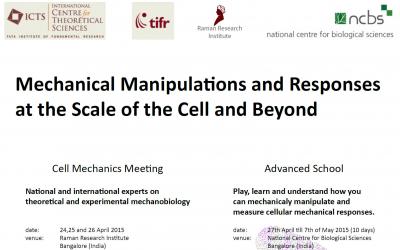This is a joint program of ICTS with NCBS and RRI, Bangalore. This is second program on the announced topic and is being organized following the highly successful first program, which was organized by ICTS jointly with NCBS and MechanoBiology Institute, Singapore.
The understanding of biological processes at a cellular and sub-cellular scale has made a big leap forward, thanks to the new tools that have made the advance from a qualitative to a quantitative description possible. The application of a wide variety of techniques to mechanically manipulate single molecules or multi-cellular cell composites has allowed scientists to address the question of how organisms react to controlled mechanical cues. This two weeks long program introduces a bouquet of techniques to gain quantitative information of responses of biological material (at all scales) to perturbations of a mechanical nature, and explores how the combination of theory and experiments will lead to a systematic deciphering of the physics of how living material engages with mechanical information. In addition, there will be a discussion meeting, to discuss recent results in the field of Cell Mechanics.
The program will be organized in two parts, an advanced school and a discussion meeting:
Scope of Advanced School
The practical part is intended primarily for early career scientists: PhD candidates and postdoctoral fellows at the beginning of their projects. Participants choose three out of eight available modules. Instruction will consist of a set of basic lectures, hands-on practical sessions and research talks. In addition, a strong theoretical thread in form of a theory module and the interaction with theoretical bio-physicists will accompany the experimental fabric of this two week engagement, both during the workshop and the conference.
Scope of Discussion Meeting
The advanced school starts with a three days discussion meeting gathering the Indian cell mechanics community and researchers from abroad to present their current research and discuss about future research opportunities in current research topics.
 ncbs
ncbs res
res in
in

